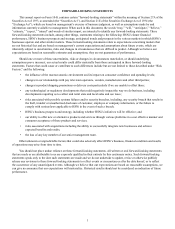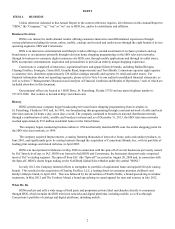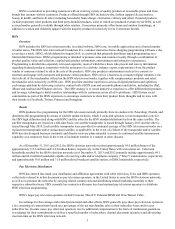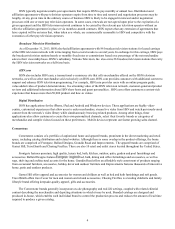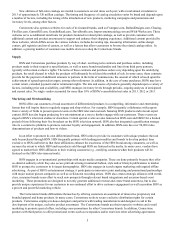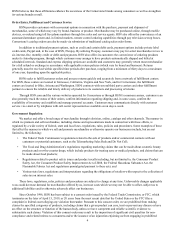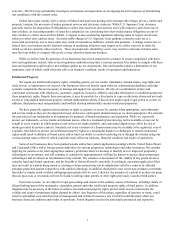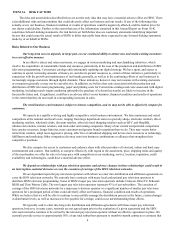Home Shopping Network 2013 Annual Report Download - page 13
Download and view the complete annual report
Please find page 13 of the 2013 Home Shopping Network annual report below. You can navigate through the pages in the report by either clicking on the pages listed below, or by using the keyword search tool below to find specific information within the annual report.11
The processing, storage, use and disclosure of personal data could give rise to liabilities as a result of governmental
regulation, conflicting legal requirements or differing views of personal privacy rights.
In the processing of consumer transactions, we receive, transmit and store a large volume of personally identifiable
information and other user data. The sharing, use, disclosure and protection of this information are governed by the privacy and
data security policies maintained by us. Moreover, there are federal, state and international laws regarding privacy and the
storing, sharing, use, disclosure and protection of personally identifiable information and user data. Specifically, personally
identifiable information is increasingly subject to legislation and regulations in numerous jurisdictions around the world, the
intent of which is to protect the privacy of personal information that is collected, processed and transmitted in or from the
governing jurisdiction. We could be adversely affected if legislation or regulations are expanded to require changes in business
practices or privacy policies, or if governing jurisdictions interpret or implement their legislation or regulations in ways that
negatively affect our business, financial condition and results of operations.
We are subject to online and other cyber security risks and cyber incidents, including security and data breaches
and identity theft.
To succeed, we must be able to provide for secure transmission of confidential information over public networks. We
have observed an increased number of cyber attacks that include attempts to gain unauthorized access to digital systems for
purposes of misappropriating assets or sensitive information. Our failure, and/or the failure by the various third party vendors
and service providers with which we do business, to comply with applicable privacy policies or federal, state or similar
international laws and regulations or any compromise of security that results in the unauthorized release of personally
identifiable information or other user data could damage the reputation of our businesses, discourage potential users from
trying our products and services and/or result in fines and/or proceedings by governmental agencies and/or consumers, one or
all of which could adversely affect our business, financial condition and results of operations. Any penetration of network
security or other misappropriation or misuse of personal consumer information could cause interruptions in the operations of
our businesses and subject us to increased costs, litigation and other liabilities. Security and data breaches could also
significantly damage our reputation with consumers and third parties with whom we do business. We may be required to
expend significant capital and other resources to protect against and remedy any potential or existing security and data breaches
and their consequences. We also face risks associated with security and data breaches affecting third parties with which we are
affiliated or otherwise conduct business online.
We could be subject to additional sales tax liability, including liability for past sales.
U.S. Supreme Court decisions restrict the imposition of obligations to collect state and local sales taxes with respect to
sales from out-of-state retailers. As a result, approximately 39% of our revenue is not currently subject to sales tax or its
equivalent. However, an increasing number of states have adopted or are considering laws that attempt to impose obligations
on out-of-state retailers to collect taxes on their behalf. Congress is also considering legislation allowing states to require out-
of-state sellers to collect sales and use taxes. It is not possible to predict with any degree of certainty the outcome of these
initiatives or the impact of these initiatives on our business and marketing strategies that we are considering or may consider in
the future.
An unfavorable change in U.S. Supreme Court guidance related to sales tax, or a successful assertion by one or more
states may result in material tax liabilities, interest and penalties. A change in state or federal laws, or our business model,
business strategy, or marketing initiatives may require us to collect sales tax on transactions in which we do not currently
collect such tax. These developments, should they occur, may result in a decrease in future sales, may decrease our ability to
compete, or otherwise harm our business.


